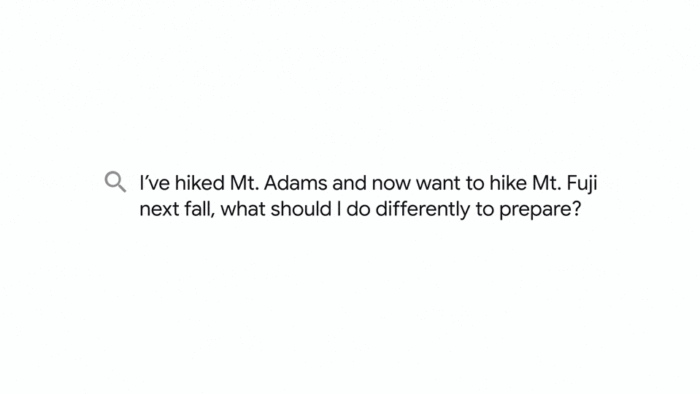Happy New Year! Who doesn’t love a fresh start?! It’s back to reality, for better or worse.
Every year at this time, I like to cover the top 2022 SEO Trends that marketers need to be aware of.
As I like to say, even though the pace of change is relentless, most SEO Trends and updates enter the picture more as a gradual build-up rather than a whiplash. In case you missed my 2021 SEO recap, you can check that out here.
Let’s jump in!
The Rising Prevalence of SEO Automation, Machine Learning, and Intelligence
Do SEO acronyms like NLPs, MUM, BERT, and LaMDA make you shudder (or more likely groan)?
SEO is complex enough without throwing machine learning, AI, and automation into the mix, right? Don’t shoot the messenger, but these aren’t going away anytime soon.
In fact, you’ll be hearing a lot more about these items over the next year+. Here are six points to help you wrap your mind around this concept—and what you need to do about it:
- So. Much. Data. While Google doesn’t give exact data on the number of Google searches per day, it’s estimated to be in the range of 5.6 billion-with-a-b searches per day. When you couple that with the fact that Google’s crawlers are constantly scouring the web for new content, pages, articles, images, and videos that’s a lot of data it has to contend with. Enter machine learning and NLPs (natural language processing), which is necessary to make sense of it all and deliver back to the end-user in micro-seconds.
- Google has been eyeing intelligence and automation for some time now. They want to make quicker connections and instantaneously understand queries and return results in the blink of an eye. Google has said, “Automation and intelligence combined together will allow us to have longer term, more meaningful relationship with our end users and customers. I’m very, very excited about it, because marketing’s job will not only be to interrupt, but to actually deliver delight.”
- SEO automation – from a high level, this means machines/tools are replicating manual SEO tasks. According to SEO Clarity, an enterprise SEO platform, SEO Automation consists of advanced processes that help you make sense of the heaps of data that sit before you.
- BERT (Bidirectional Encoder Representations from Transformers) was announced in 2019, sharing that using NLP, Google utilizes artificial intelligence to understand how the words in a query string relate to each other rather than looking at the meaning of each word individually.
- MUM (Multitask Unified Model) is Google’s latest golden child. Google says MUM is a thousand times more powerful than BERT. It expands on BERT’s ability to understand language and context and brings multitasking to search. A search using MUM can read and understand text, incorporate information from video and images, and combine data from over 75 languages to provide answers with results so comprehensive. According to Search Engine Journal, MUM can provide a comprehensive answer to a query such as, “What are the differences between bodies of water like lakes, rivers, and oceans?” Or take this doozy, introduced by Google’s Prabhakar Raghavan at I/O 2021: “”I’ve hiked Mt. Adams and now want to hike Mt. Fuji next fall, what should I do differently to prepare?”

- LaMDA, or Language Model for Dialogue Applications. This is a new advanced voice technology to communicate with an AI — like a chatbot — much more naturally. Voice search and conversational search has plateaued over the years, but Google is forging ahead with advancements in this area.
Marketers—How Does This Impact Your SEO Strategy?
One of the most interesting things that come from this, is what marketers need to “do” in 2022. This is a subject I’ll be covering more in-depth over the coming weeks and in a training I’m launching later this quarter.
- Schema – structured data and rich snippets have been important for years and will continue to be as Google’s machines and algorithms reward content that they can understand.
- EAT – comprehensive, authoritative content. Organizations will need to double down to stake their flag in the ground around their topics of expertise.
- Content Diversity – don’t just create a one-and-done blog. Content clusters will be important, as will creating various formats such as videos, video shorts, and graphics.
- Keywords – keywords still matter. #sorrynotsorry. You still need to know the language your customers use around their pain points, their lives, and how that intersects with your expertise, information, services, and products.
- Intent – understanding Searcher Intent, and what people want to do with the information, is critical to address before you set pen to paper (or fingers to keyboard or finger to record).
- Performance – Page Experience, Core Web Vitals…you know, all the things SEO professionals have been talking about for 2+ years now.
- Tools – with more data, more complexity, and more nuances, SEO tools that provide automation (giving you insight in order to implement more effectively and quickly) are more critical than ever. (I use Semrush for example).
Get your house in order, be decisive, implement swiftly, and let’s gain momentum in 2022. Glad you’re here for the journey!
SEO |